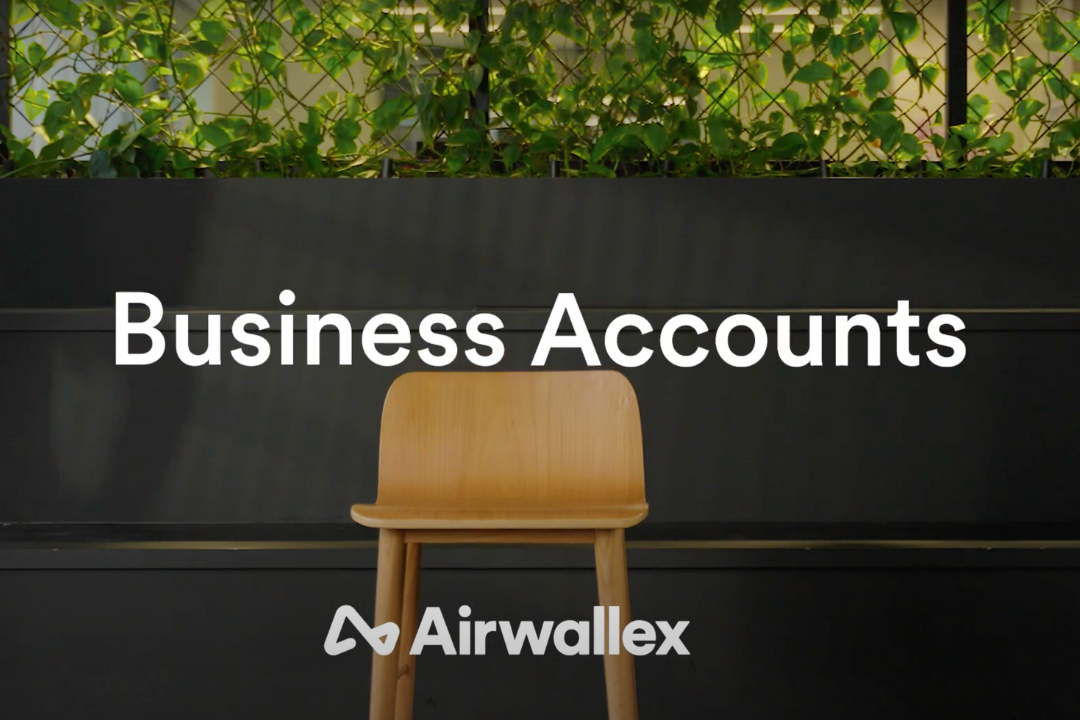How to open a business bank account in Australia

Isabelle Comber
Business Finance Writer

A business bank account helps separate personal and company finances, which is key for managing tax obligations, tracking cash flow, and staying compliant. In this article, we’ll give you the complete lowdown on how business bank accounts work, what you need to consider before opening a business bank account, and everything you need to get started with your own account.
With so many business bank account options on the market, we’ll also examine some powerful digital business account alternatives to the traditional bank account that are changing the ways that businesses manage their financial operations.
What is a business bank account?
In Australia, the term typically refers to an account from a licensed bank. A 'business bank account' is typically offered by a financial institution with a banking licence and is regulated as such. In contrast, a 'business account' usually refers to a fintech solution, which can offer many of the same features, like international transfers and expense tracking, without holding a banking licence. These options are increasingly popular with businesses looking for faster setup, better integration, and lower international fees.
Separating your personal and business transactions in a dedicated account simplifies accounting, helps you build credibility with customers and suppliers, and gives you the overview you need to make better decisions about your business. It also helps you track your business income and expenses, making things like paying bills, handling payroll, and managing your taxes much easier.
Not only does it make good sense from a money management point of view, but having a separate account may be a legal requirement if you’re operating a registered business, partnership, or trust in Australia.
While sole traders and freelancers aren’t legally required to have a business account, many choose to use one to keep their personal and business finances separate, organise their income for tax purposes, and boost their professional image.
Do I need an Australian bank account?
In Australia, almost all registered businesses, from small startups to large corporations, choose to open business bank accounts or a specialised business account from a non-bank financial provider to manage their finances.
So, should you open a business bank account? Well, if you are a:
Sole trader: You don’t legally need one, but it makes managing business easier.
Partnership, company or trust: You are legally required to have a dedicated Australian bank account for tax purposes.
If you’re not sure what type of business structure you have, then you can use your Australian Business Number (ABN) to search the ABN Lookup to see your business registration.
How are business bank accounts different from personal accounts?
Business accounts or business bank accounts are a hub for your business's financial activities, where you can handle essential financial activities like depositing revenue, managing expenses, and processing payroll.
They're not fundamentally different from personal accounts, but they do come with special features tailored to meet the needs of businesses. This means you can handle larger transaction volumes, possibly access business lending options (depending on your account type and provider), and enjoy other specialised services that might not be available with a personal account, such as the ability to issue employee cards and tools for financial analysis and reporting.
Banks and financial providers offer different kinds of business accounts, each with their own set of rules and perks and often customised to fit particular business sizes or industries. There may be specific benefits and features aligned with business operations.
While there are many benefits, it’s important to check for any fees or charges that may apply. For example, business accounts may charge you for features like bank transfers that come free with personal accounts. If you’re looking to move money internationally for your business, there may be other associated costs with some accounts, and you might choose a provider that provides low-cost international money transfers.
What’s the difference between a Business Account and a Business Bank Account?
A business bank account is opened with a financial institution that holds a formal banking licence. These accounts are governed by banking regulations and are designed to support businesses that need traditional services like secure deposits, lending options, and in-branch support.
A business account, in contrast, typically refers to an account provided by a fintech company that operates under alternative financial licences but not a banking licence. These accounts usually offer modern tools for collecting payments, managing expenses, and making international transfers, but without some of the conventional services you’d expect from a bank.
What fintech providers like Airwallex offer is flexibility. You can expect faster onboarding, streamlined international payments, smart integrations with platforms like Xero, and tools that help you manage multiple currencies or issue employee cards—all without needing a bricks-and-mortar bank.
The main difference lies in how these services are built and regulated. Banks still serve many businesses well, especially those wanting loans or face-to-face service. But fintechs are changing the game for companies that want speed, digital-first tools, and global reach without the legacy systems.

How to choose the right business account provider?
The range of business accounts offered by both established banks and non-bank specialist providers in Australia is vast. Business accounts come packed with features that not only streamline your operations but also offer numerous value-added benefits, making them an important part of your business’s success.
Of course, there are costs associated with opening and operating your business account which you'll want to minimise, and these depend on the provider you select.
Here are some factors to consider when weighing up your choices:
Account and transaction fees: Review the account and transaction fees to ensure the services provided justify them. For small businesses, a fee-free account might work, particularly for online-only transactions. Alternatively, consider an account with a low monthly fee that includes some free transactions.
International fees: If you’re sending and receiving money internationally, it's important to find a provider that offers competitive rates.
Credit services: If you need to access finance to expand or boost your cash flow, it’s important to consider accounts that come with affordable overdraft facilities and credit services.
Local networks: Not all international banks have a presence in Australia, so if you choose one for your business banking, make sure they have a local partner bank that can help you out.
Online services and customer support: Does the provider offer an easy-to-use online platform and, if you need it, a way to contact and access customer support to resolve any issues you might have?
Business features: Will you be able to easily manage EFT, multiple and batch payments and integrate your account with your business management and accounting software?
Comparing business bank accounts from the ‘Big Four’
If you're starting a business in Australia, there's a good chance you're weighing up options from the Big Four banks: Commonwealth Bank, NAB, ANZ and Westpac. They all offer solid business accounts, but the right choice can come down to the finer details like how you prefer to bank, the types of transactions you make, and what kind of flexibility you need as your business grows.
Here’s a snapshot of what each bank offers as of May 2025. For the most up-to-date details, check directly with the banks:
Commonwealth Bank (CBA)
Business Transaction Account – Online: No monthly fee. Ideal for businesses that bank primarily online. Fees apply for staff-assisted transactions.
Business Transaction Account – In Branch: $10 per month, including 20 free staff-assisted transactions. You can switch between Online and In Branch access.
Extras: Mobile app functionality, Xero integration, and a Business Online Saver to help you earn interest on surplus funds.
National Australia Bank (NAB)
Business Everyday Account (no monthly fee): Designed for online-first businesses with minimal branch use. Assisted transactions attract fees.
Business Everyday Account ($10/month): Includes 30 free staff-assisted transactions per month.
Extras: Quick online setup, integrations with Xero, MYOB and Reckon, overdraft options, and responsive customer support.
Australia and New Zealand Banking Group (ANZ)
Business Essentials: No monthly fee. Suitable for sole traders or small businesses. Assisted and manual transactions are charged per use.
Business Extra: $10 monthly fee includes 20 staff-assisted transactions. Offers higher daily limits, multiple user permissions, and co-authorisation features via Internet Banking for Business (IB4B).
Extras: Great for businesses that need added security controls and flexible payment workflows.
Westpac
Business One: No monthly fee. Geared towards digital-first businesses. Assisted transactions incur separate charges.
Business One Plus: $10 per month for 25 included staff-assisted transactions. Pair it with a Cash Reserve account to access bonus interest rates.
Extras: Online and mobile tools, accounting software compatibility, and limited-time offers on business savings.
Traditional banks still serve many Australian businesses well, especially those focused on local operations. But for companies working across borders, managing spend in multiple currencies, or looking for a more streamlined digital experience, newer platforms like Airwallex can offer tools and features that go further than a standard business account.
Can you have the best of both worlds? Yes! Many businesses choose to open a business account with a fintech provider alongside their traditional business bank account.
Alternative platforms offering integrated business banking services
If you’re looking for a platform that offers business accounts tailored to modern businesses, Airwallex offers integrated banking services with an all-in-one account solution. Under its single unified platform you can access a multi-currency account, suite of digital tools, integrations, market-leading FX and no hidden fees.
Can I open a business account (form a FinTech) alongside my business bank account?
Yes. Business accounts are great for getting started, borrowing and moving money domestically. Many businesses quickly realise the limitations and fees associated with their business account as they grow – espeically internationally – and soon opt for fintech providers who offer purpose-built business solutions such as international payments, invoicing, company cards and expense management.
How to open a business bank account in 5 steps
To open a business bank account, you’ll need to go through a financial institution with a banking licence, typically a traditional bank.
Research providers: Compare options based on your business’s needs, fees, international features, and support.
Gather documentation: For sole traders, this usually includes an ABN and photo ID. Companies will also need their ACN and documentation about directors and shareholders. Trusts and partnerships may require trust deeds or partnership agreements.
Choose how to apply: Depending on your provider, you may be able to apply online, over the phone, or at a branch.
Submit your documents: Upload or provide the necessary paperwork and respond to any requests for extra information.
Activate and set up: Once verified, deposit funds, order cards, connect your account to software tools like Xero, and start transacting.
What documents do I need to open a business bank account in Australia?
For Australian business owners, opening a business bank account or business account is straightforward but may vary slightly depending on the provider you choose. You'll generally need to provide your business registration details and information about your business structure and industry to help the provider match you with the best account type.
Here’s a document checklist for each business structure:
For companies:
Australian Company Number (ACN)
Certificate of incorporation
Company constitution or board resolution
ID for directors and beneficial owners
For sole traders/freelancers:
Australian Business Number (ABN)
Valid photo ID
Proof of business address (e.g. utility bill or lease)
For partnerships or trusts:
Partnership agreement or trust deed
ABN and tax file number (TFN)
ID for all partners or trustees
In most cases, government-issued photo IDs like a passport or driving licence will be accepted, or a combination of other documents that show your identity and address together.
The application process is generally quick once you’ve submitted all the relevant documents and information. However, verification checks can extend the time taken to open your account and you might be asked to give more information or paperwork to support your application.
Non-bank providers (and many banks) will allow you to apply to open a business account online through a fully digital account application process where you upload and submit the required documentation before being verified.
5 things to consider before opening a business bank account
1. Fees and charges
It's important to carefully review the fee structure of any prospective business account. Look for details on monthly account maintenance fees, transaction fees (such as charges for transfers), and potential hidden costs like fees for excess transactions or early account closure. Understanding these fees helps you know what you’re responsible for and ensures there are no surprises.
2. Interest rates and benefits
Some business accounts offer interest or returns on the balances maintained. Depending on the amount in your account, this can deliver a substantial boost to your business. Also, review other benefits that could support your business operations, such as discounts on business software, reduced rates on business loans, or cashback on corporate spending. These benefits can add value beyond the basic account functions.
3. Digital capabilities
Assess how you'll access the services that are available with the account. Key features to look for include comprehensive online platforms, mobile app capabilities, and detailed financial reporting tools. Make sure these services integrate well with your business’s operational needs, like payroll management, expense tracking, and easy access to financial reconciliation.
4. Customer support
High-quality customer support is essential for handling the complexities that can come with business banking. Evaluate the availability and responsiveness of customer service options provided by the provider. This includes traditional phone support, as well as support channels like email, chat, or even dedicated account managers. Having a great support team on your side can save you significant time and frustration as your business grows.
5. Scalability
The business account you choose should be able to scale with your business growth. This means the account should accommodate higher transaction volumes and provide additional services as your business needs evolve. For example, as your business grows, you may need enhanced credit options, more complex cash management services, or better international transaction capabilities. Check if the provider can support your business not just now but also in the future as you expand.
Which business accounts work best for going global?
If your business is operating across borders or has plans to some accounts will make that easier than others. Traditional business bank accounts can handle basic international transfers, but they often come with higher fees, slower settlement times, and limited currency options.
An Airwallex business account is a dynamic bankalternative specially designed to make managing your domestic and international business payments easier and help your business grow.
It’s why Australian businesses of all sizes are switching to Airwallex to manage their business finances. They appreciate the convenience of having one platform to access low fees, multi-currency accounts, high-speed international transfers, borderless cards, Expense Management software, and online payments.
Plus, if your business has plans to expand operations overseas, or you do a lot of business with international suppliers, Airwallex provides you with the tools you need for hassle-free global financial operations. Sending and receiving money internationally is cheaper, at low rates that help you minimise your transaction costs.
Global Accounts also function as local currency accounts in your name that come with local bank and branch codes and dedicated account numbers. They make it easy for you to receive funds domestically and internationally into your Airwallex account from multiple countries and regions without getting involved with local banks.
With Airwallex accounts, you can also relax knowing that your money is safe and secure with world-class information security standards and end-to-end encryption.
Our goal is to save you time, and we focus on getting you up and running within 1–3 business days after you submit all of the required business information. After that, you have immediate access to your account and can start sending and receiving funds. Your account can also link directly to leading platforms like Xero, making it simple to sort your end-of-year financials.
How do Airwallex Business Accounts stack up?
Here’s a roundup to help you see how we compare:
Features and benefits: Set up multi-currency business accounts in a huge range of currencies, allowing you to send, hold, and receive foreign currencies without unnecessary conversions.
Virtual debit cards: Instantly create and use multiple virtual debit cards.
Physical multi-currency cards: Effortlessly order physical debit cards for your team and have them delivered immediately.
Expense management: Ditch the receipts and outdated software for a streamlined, automatic experience that your team will appreciate.
Accounting integrations: Keep your finances in check with seamless integration between your Airwallex Business Account and leading accounting software platforms, simplifying financial reconciliation.
Immediate access: Activate your account and start using it as soon as it’s verified, with no extended wait times or delays.
Ready to simplify how you manage business finances?
If you're looking for more than just a basic account, Airwallex is built to do more. Our Global Business Accounts let you collect, hold, and pay in multiple currencies without forced conversions. You can issue employee cards, manage expenses in real time, and automate workflows with our Xero integration. All from a single platform, with transparent pricing and world-class security.
Create an account in minutes and see how Airwallex can help your business move faster, smarter, and with fewer fees.
Related articles about business banking:
How to open a business bank account: frequently asked questions
How long does it take to open a business account or business bank account?
Application and verification times vary depending on the provider you choose (traditional bank or non-bank alternative) and the method needed to apply (in-branch or online). Modern non-bank alternatives can often get you up and running quickly, allowing you to answer key questions and upload documents online in as little as one or two business days.
Do start-ups need a business account?
Australian registered companies, partnerships, and trusts are required by law to have a separate business account for tax purposes. No matter the legal status of your startup, you're setting yourself up for success by having a business account to manage your finances. It helps separate personal and business transactions, simplifies accounting, and elevates the professional image of your new venture, which can be crucial for attracting investors and establishing credibility with customers.
What is the main purpose of opening a bank account?
The primary purpose of a business bank account is to keep your business finances separate from personal ones. This helps with compliance and tax reporting and simplifies everyday cash flow management, enables payroll, and can improve your business’s professional credibility with clients and suppliers.
Are there any benefits to a business bank account?
Yes. Having a business account makes it easier to track expenses, pay employees, and manage tax. You’ll also gain access to tools like transaction reporting, integrations with accounting platforms, and in some cases, lending options. It’s a foundation for building a reliable financial setup.
What is the best bank to use to open a business account in Australia?
It depends on what you're after. The Big Four banks—CBA, NAB, ANZ, and Westpac—offer reliable options for local transactions and in-branch support. But if you're after faster setup, fewer fees, and better global features like multi-currency accounts and expense tools, fintech providers like Airwallex may be the smarter choice.
Which platform offers integrated business banking services?
There are a few platforms that offer integrated banking services in Australia, and that includes Airwallex. Airwallex offers a global multi-currency account combined with tools such as expense management, accounting integrations, corporate cards, multi-currency capabilities and competitive foreign transfers.
Can a foreign company open a business bank account in Australia?
Yes, but it often requires registering with ASIC and getting an ABN or ACN. Banks usually ask for detailed company and director information. If you want a simpler option, fintech providers like Airwallex offer local AUD accounts without needing a full Australian entity—making it easier to manage payments from overseas.
Disclaimer: The information in this article is based on our own online research. Airwallex was not able to manually test each tool or provider. The information is provided for educational purposes only and a reader should consider the specific requirements of their business when evaluating providers. This research is reviewed annually. If you would like to request an update, feel free to contact us at [[email protected]]. This information doesn’t take into account your objectives, financial situation, or needs. If you are a customer of Airwallex Pty Ltd (AFSL No. 487221) read the Product Disclosure Statement (PDS) for the Direct Services available here.
View this article in another region:Canada - EnglishCanada - FrançaisHong Kong SAR - EnglishHong Kong SAR - 繁體中文SingaporeUnited KingdomUnited States

Isabelle Comber
Business Finance Writer
Izzy is a business finance writer for Airwallex, specialising in thought leadership that empowers businesses to grow without boundaries. Izzy has more than four years of experience working alongside Aussie startups and SMEs, having previously worked at one of the country’s leading HR tech companies. Izzy’s diverse experience across business operations, from people to finance, brings a unique perspective to her current role.
Posted in:
Business bankingShare
- What is a business bank account?
- Do I need an Australian bank account?
- How are business bank accounts different from personal accounts?
- What’s the difference between a Business Account and a Business Bank Account?
- How to choose the right business account provider?
- Comparing business bank accounts from the ‘Big Four’
- How to open a business bank account in 5 steps
- What documents do I need to open a business bank account in Australia?
- 5 things to consider before opening a business bank account
- Which business accounts work best for going global?
- How do Airwallex Business Accounts stack up?
- Ready to simplify how you manage business finances?


